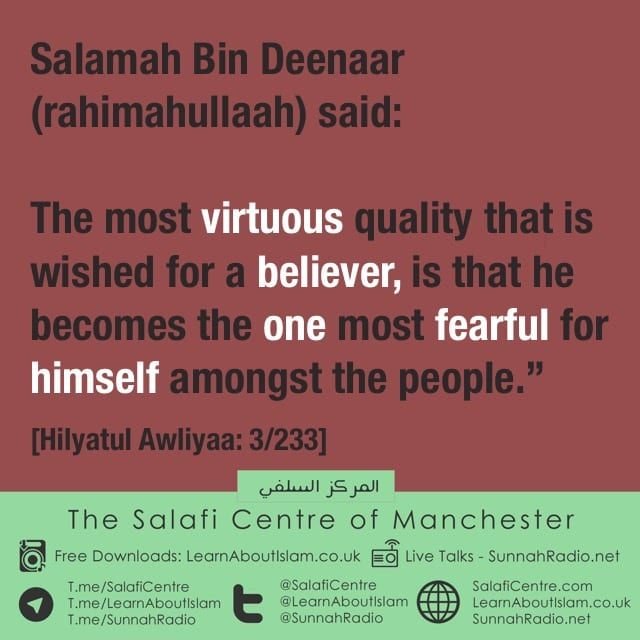In The Name of Allah, The Most Merciful, The Bestower of Mercy.
Maqil Bin Yasar, may Allah be pleased with him, narrated that Allah’s Messenger, peace and blessings of Allah be upon him, said, “Worship during Al-Harj is like emigrating to me”. [1]
Imam An-Nawawi, may Allah have mercy upon him, said:
The intent behind Al-Harj in this Hadith is when the affairs of the people are in a state of Ikhtilaat [i.e. chaos, confusion, disorder, disarray etc]. The reason behind the great virtue of worship during this state of affairs is because the people are heedless of worship and diverted from it, and none fulfils it except individuals. [2]
Al-Allamah Salih Al-Fawzan, may Allah preserve him, said:
The intent behind Al-Harj is Al-Ikhtilaat [i.e. chaos, confusion, disarray] when it occurs between the Muslims. This is because many people are diverted from worship due to this state of confusion. Also killing and blood shed occurs during this state of affairs. Allah’s Messenger, peace and blessings of Allah be upon him, urges a person to engage in worship during the time of fitan because the majority of the people are diverted from worship. The one who busies himself with worship is like one who has migrated to Allah’s Messenger, peace and blessings of Allah be upon him. You know the virtue Al-Hijrah [migration]! Al-Hijrah in the Arabic language means to abandon. Allah said: [وَٱلرُّجۡزَ فَٱهۡجُرۡ – And keep away from the idols]. [Al-Muddathir. 5]
The one who engages in worship during times of fitan and it does not divert him from worship has the reward of one who migrated to Allah’s Messenger, peace and blessings of Allah be upon him, because a Muhaajir [emigrant] leaves his country and flees to Allah’s Messenger in order to safeguard his religion. This took place in the early Islamic era – during the era of the Messenger. So, the word Hijrah [migration] in the Islamic legislation means to leave the land of kufr and settle in the land of Iman in order to safeguard one’s religion.
The word Hijrah is also intended to mean abandonment in general, so the one who abandons Fitna and busies himself with worship has abandoned Fitna and proceeded towards worship. Therefore, Hijrah means to abandon something. Allah’s Messenger said: “A (true) Muslim is the one whom other Muslims are safe from his tongue and hands, and a Muhaajir [emigrant] is one who refrains from what Allah has forbidden”.[a] Therefore, he is a Muhaajir because he abandons what Allah has forbidden and fulfils what Allah has commanded. This Hadith urges a person to engage in worship during times of fitna because Fitna diverts people from worship except the one whom Allah blesses with the ability to abandon Fitna and engages in worship.
However, this does not mean that one refrains from warning against Fitna and clarifying for the people, rather – firstly – he abandons Fitna, warns the people and forbids them from it. This is because just as he would like the people to come to him with good, he should also go to them with good. Just as he loves to be safe from Fitna, he should also love the same for the people. This deed of his is Jihad [striving in the path of Allah] and Inkarul Munkar [i.e. the virtuous act of rejecting evil]. [3]
Al-Allaamah Rabee bin Hadi Al-Mad’khali, may Allah have mercy upon him, stated:
Let us increase in obedience to (Allah). Let us be mindful of Shubuhaat and Shahawaat, for indeed the Fitan will be exposed to the hearts. Hudhaifah, may Allah be pleased with him, reported from Allah’s Messenger, peace and blessings of Allah be upon him, who said, “The Fitan will be exposed to the hearts of the people like a reed mat woven stick by stick, and any heart afflicted by them will have a black mark put into it, but any heart that rejects them will have a white mark put into it. Thus there will be two kinds of hearts: one is pure like a white gemstone and it will not be harmed by any tribulation as long as the heavens and earth endure, and the other is black and dusty like a worn-out vessel, neither recognizing good nor rejecting evil, but rather immersed in its desires”. [Sahih Muslim. Number 144]
The first type of heart: “Pure like a white gemstone and it will not be harmed by any tribulation as long as the heavens and earth endure”. This is because Allah grants them firmness and not due to their own power or strength; rather Allah grants them firmness:
يُثَبِّتُ ٱللَّهُ ٱلَّذِينَ ءَامَنُوا۟ بِٱلْقَوْلِ ٱلثَّابِتِ فِى ٱلْحَيَوٰةِ ٱلدُّنْيَا وَفِى ٱلْءَاخِرَةِ
Allah will keep firm those who believe, with the word that stands firm in this world (i.e. they will keep on worshipping Allah Alone and none else), and in the Hereafter. [Ibrahim 27]
Allah bestows His favour upon them by granting them firmness, thus, they are not harmed regardless of the greatness of the Fitan. Let me strike a similitude: I say, indeed amongst the people in the midst of these Fitan – just as Allah’s Messenger described the situation- are those who are firm like mountains; the winds, floods, hurricanes and storms come along, but they do not shake because the Iman in the hearts is like the firm mountains. Allah keeps them away from the Fitan and makes them firm, so they are not harmed. However, other people are like the trees that are moved -by the wind – to the right and the left until they finally fall. Others are like feathers and the Henna leaves- flying along with the Fitan when little Fitna occurs, such as when a mild wind (blows) the fragile leaves to a far-off place. We ask Allah to keep us firm.
The second type of heart is described as “Black and dusty like a worn-out vessel, neither recognising good nor rejecting evil, but rather immersed in its desires”. This is the state of the one whose heart is immersed in Fitnah. He agrees with it and does not reject it, so the Fitnah enters him gradually until his heart is worn out and thus becomes black like a worn-out vessel – a vessel whose mouth is turned upside down, this, regardless of the amount of water, butter fat and other things one attempts to pour into it, it will not accept anything. Indeed, we have often experienced the affair of this category of people – whose hearts are worn out – and regardless the of proofs and pieces of evidence- from the Qur’an and Sunnah – presented to nullify their falsehood, they do not accept that from you. This has to be the case because indeed Allah’s Messenger described such a person as one with a heart that is similar to a worn-out vessel- a heart that neither recognises truth nor rejects evil; rather it is immersed in its desires. Whatever agrees with his desires, he accepts it- not because it is the truth, but rather only because it agrees with his desires. This is similar to the Yahud [i.e. those Yahud who rejected the clear message of the final Messenger], for they know the truth, but wage war against it – accepting what agrees with their desires and rejecting what opposes their desires and wage war against it. This is something rife in this era amongst those whose hearts are worn-out, thus, they reach this state that has been described by Allah’s Messenger.
It is as if we are witnessing this matter whilst Allah’s Messenger describes these people -in our presence- and we can see their deeds and dishonourable stances. [4]
We ask Allah after Tashahud and before tasleem:
اللَّهُمَّ بِعِلْمِكَ الْغَيْبَ وَقُدْرَتِكَ عَلَى الْخَلْقِ أَحْيِنِي مَا عَلِمْتَ الْحَيَاةَ خَيْراً لِي وَتَوَفَّنِي إِذَا عَلِمْتَ الْوَفَاةَ خَيْراً لِي، اللَّهُمَّ إِنِّي أَسْأَلُكَ خَشْيَتَكَ فِي الْغَيْبِ وَالشَّهَادَةِ، وَأَسْأَلُكَ كَلِمَةَ الْحَقِّ فِي الرِّضَا وَالْغَضَبِ، وَأَسْأَلُكَ الْقَصْدَ فِي الْغِنَى وَالْفَقْرِ، وَأَسْأَلُكَ نَعِيماً لَا يَنْفَذُ، وَأَسْأَلُكَ قُرَّةَ عَيْنٍ لَا تَنْقَطِعُ، وَأَسْأَلُكَ الرِّضِا بَعْدَ الْقَضَاءِ، وَأَسْأَلُكَ بَرْدَ الْعَيْشِ بَعْدَ الْمَوْتِ، وَأَسْأَلُكَ لَذَّةَ النَّظَرِ إِلَى وَجْهِكَ وَالشَّوْقَ إِلَى لِقَائِكَ فِي غَيْرِ ضَرَّاءَ مُضِرَّةٍ وَلَا فِتْنَةٍ مُضِلَّةٍ، اللَّهُمَّ زَيِّنَّا بِزِينَةِ الْإِيمَانِ
وَاجْعَلْنَا هُدَاةً مُهْتَدِينَ
O Allah! By Your Knowledge of the unseen and by Your Power over creation, let me live if life is good for me, and let me die if death is good for me; O Allah! I ask You to grant me (the blessing of having) fear of You in private and public, and I ask You (to make me utter) a statement of truth in times of contentment and anger, and I ask You for moderation when in a state of wealth and poverty, and I ask you for blessings that never ceases, and I ask You for the coolness of my eye that never ends, and I ask You (to make me pleased) after (Your) decree; and I ask You for a life of (ease, comfort, tranquillity, etc) after death; I ask You for the delight of looking at Your Face (i.e. in the Hereafter) and yearning to meet You without any harm and misleading trials (coming upon me). O Allah! Adorn us with the adornment of Iman, and make us (from those who are) guided and guiding (others).
O Allaah! Let Me Live If Life is Good For Me And Let Me Die if Death is Good For Me
We ask Allah in general:
اللَّهُمَّ أَصْلِحْ لِي دِينِي الَّذِي هُوَ عِصْمَةُ أَمْرِي
وَأَصْلِحْ لِي دُنْيَايَ الَّتِي فِيهَا مَعَاشِي
وَأَصْلِحْ لِي آخِرَتِي الَّتِي فِيهَا مَعَادِي
وَاجْعَلِ الْحَيَاةَ زِيَادَةً لِي فِي كُلِّ خَيْرٍ
وَاجْعَلِ الْمَوْتَ رَاحَةً لِي مِنْ كُلِّ شَرٍّ
O Allah! Rectify my religion for me, which is the safeguard of my affairs; rectify my worldly [affairs], wherein is my livelihood; and rectify my Afterlife to which is my return; and make life for me [as a means of] increase in every good and make death for me as a rest from every evil. [Saheeh Muslim Number: 2720]
O Allaah! Rectify My Religion For Me, Which The Safeguard of My Affairs – [A Tremendous Supplication]
[1] Saheeh Muslim: Kitaab Al-Fitan Wa-Ash’raat As-Saa’ah- Chapter: The virtue of Ibaadah During Al-Harj. Hadeeth Number 2948]
[2] Saheeh Muslim Bi-Sharhi An-Nawawi. Vol 17. page 70. Hadeeth Number 2948. slightly paraphrased. Publishers: Daar al-Kutub Al-Ilmiyyah. Ist Edition 1421 (Year 200) ]
[a] Bukhaari. Hadeeth Number 2382 and Muslim. Hadeeh Number 84]
[3] https://youtu.be/-HxAEXdPD-M?si=tk1PPPvtR57pA4QR
[4] An Excerpt from Marhaban Yaa Talib Al-Ilm. pages 206-208








